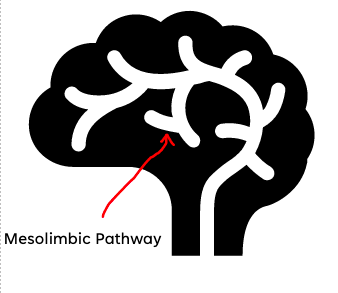Why don’t I feel motivated?
Since the teenage brain is still not fully developed, it is very common for a lack of motivation to be due to dopamine levels, and such can be heavily affected by mental illnesses.
As a teenager in high school, it can be extremely difficult to motivate oneself to actually do the homework assigned. “Due Friday” quickly becomes “do Friday” for most students today. However, this lack of motivation for schoolwork isn’t just because of the stereotypical teenage angst. It actually has to do with these three factors: the brain, dopamine, and the Mesolimbic pathway.
The teenage brain has always been, and probably always will be somewhat of a mystery to science. However, when it comes to motivation, it all comes down to the dopamine levels within the Mesolimbic pathway, better known as the Reward Pathway. Neurotransmitters from the brain contain chemical messages that can affect the rest of the body. As the chemical messages are moved from neuron to neuron, between the two neurons is where dopamine transmits the chemical signal.
The dopamine can take multiple pathways, although the most important one is the Mesolimbic pathway because by taking this pathway the brain is notified that something important is happening. This can then lead to the dopamine levels increasing. However, issues such as mental illness, lack of sleep, and drug abuse can impact dopamine levels within the body.
Dopamine levels can be boosted by rewarding experiences, like when you beat the final level in a game, or are praised by a teacher to keep up the hard work. On the other hand, low levels of dopamine cause a lack of motivation and boredom.
Many teens have no clue that their lack of motivation is due to their lack of dopamine levels, and not just laziness or exhaustion. When asked why she thinks teens have a lack of determination, Wiregrass sophomore, Robyn Coffey, explained that it could be due to lack of sleep.
“Sleep is a very important part in success, especially at school,” Coffey explained. “I think a lot of students, including myself, do not get enough sleep and it makes it hard to focus and get work done.”

A lack of dopamine levels going through the Mesolimbic pathway can also be due to mental health, which has become a huge aspect in the every-day life of a teenager. Having a bad mental health condition such as anxiety, ADHD, and/or depression can cause something called a toxic stress response. A toxic stress response is the body’s response to lasting and serious stress. If a teen isn’t able to get help in order to turn off the stress, it then effects the brain and the neurotransmitters that help with motivation.
Kylie Towry, a sophomore diagnosed with ADHD, commented how her mental health impacts getting schoolwork done.
“I have a really hard time with executive dysfunction because of my ADHD and many people think I’m just being lazy because of the misinformation,” Towry stated. “Most people see it as me only being active and not being able to pay attention.”
Mental illness is a serious matter when it comes to having the motivation a student needs. Anxiety is also a common mental illness that can affect a teenagers ability to do their homework.
As someone with anxiety, sophomore Kristen Williams has had to adjust to finding ways to stay motivated without letting her anxiety take over.
“I tend to use incentives to motivate myself to get things done,” Williams explained. “Taking breaks to do fun things, candy, or even just doing school with friends so that we can help each other stay motivated are some ways I can get things done.”
Some steps that can help increase motivation when your dopamine levels are low include:
- Set one specific achievable goal at a time
- Reminding oneself regularly of the goal at hand- break the goal into small baby steps
- Set a reward for when the goal is finished
- Constantly review the goal and progress
Some other ideas to help spark that motivation again is to ask friends and family to help you, as well as always remembering why achieving the goal is worth it. Overall, despite how tempting it is to just chill on the couch and watch Netflix, the feeling of getting something done can make the hard work feel worth it and raise dopamine levels enough to continue the motivation to get through all those assignments.
Your donation will support the student journalists of Wiregrass Ranch High School. Your contribution will allow us to purchase equipment and cover our annual website hosting costs.

Emmaly is a junior at Wiregrass and this is her second year writing for The Stampede. She did competitive cheer for 6 years, is a member of the WRHS...






